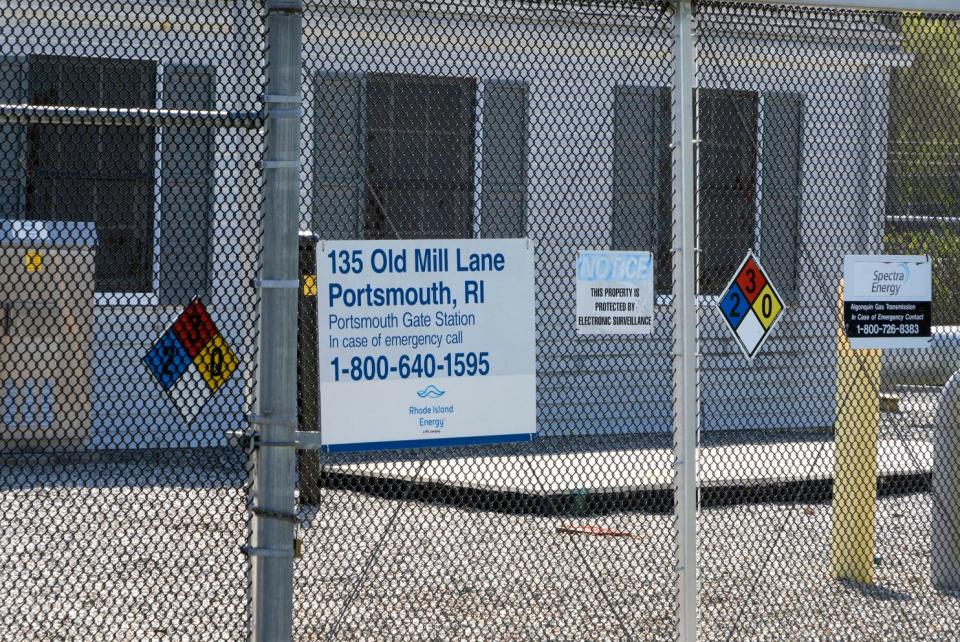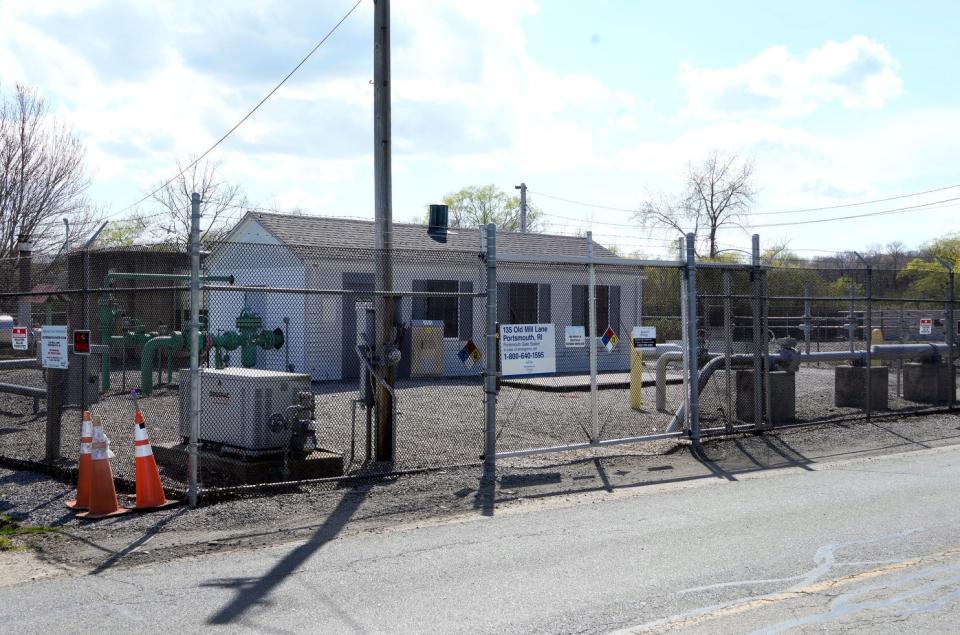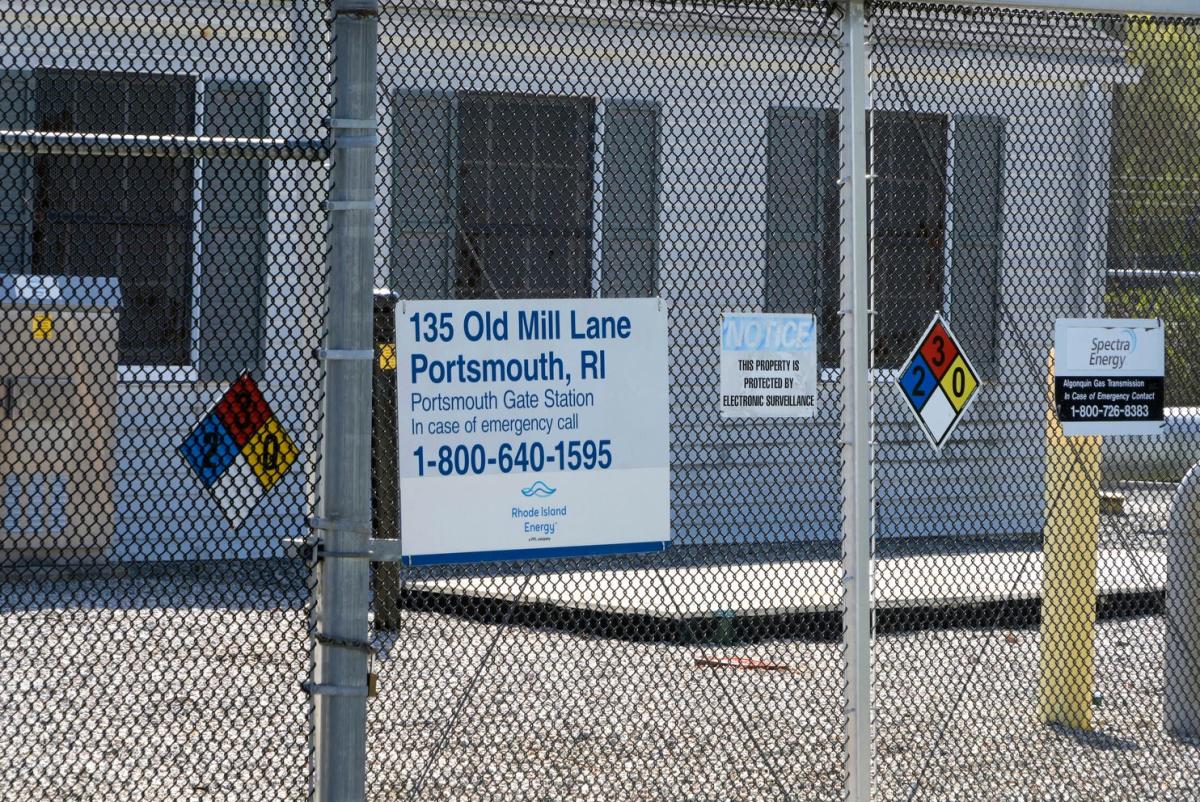PORTSMOUTH – State energy regulators are in an unusual position as they consider whether to extend the life of what was supposed to be a temporary liquefied natural gas facility in Portsmouth that has attracted the ire of neighbors.
While the Energy Facility Siting Board heard evidence that there’s a need, at least for now, for the use of LNG to back up Rhode Island Energy’s natural gas system on Aquidneck Island, stakeholders in the approval proceedings also said they want to company to do everything it can to quickly make the plant obsolete.
There are the complaints, for one, from homeowners about noise, bright lights and truck traffic associated with the LNG storage and vaporization facility that’s located in what is otherwise a residential neighborhood around Old Mill Lane on the west side of Portsmouth.
And then there are the larger policy questions about investing millions more dollars in fossil-fuel infrastructure when state law requires a sharp reduction in planet-warming greenhouse gas emissions between now and 2050.
So, as the siting board nears final deliberations on the application, its members are being urged to attach stipulations, if they vote to approve it, that would be aimed at minimizing reliance on the $15-million LNG facility.

On the table: A ban on new natural gas hookups on Aquidneck Island
At the extreme end of possibilities is a moratorium on new natural gas hookups on Aquidneck Island. While regulations prohibiting the expansion of gas connections have been enacted in other states as part of efforts to address climate change, it would be the first time such drastic action would be taken in Rhode Island.
If that sounds unlikely, consider that the person who raised the possibility, not just once but twice during recent hearings on Rhode Island Energy’s application was the panel’s chair, Ronald Gerwatowski, who also heads up the state Public Utilities Commission.
“Common sense tells me it should be on the table,” Gerwatowski said.
Why? Because the 12,500 residences and 1,800 businesses on the island relying on natural gas are supplied by a single 6-inch main crossing the Sakonnet River from Massachusetts. And even today that pipeline can’t deliver enough gas to the island to meet all those customers’ needs on the coldest days. Hence the need for a facility that can vaporize stores of LNG that have been trucked to the island and pump the resulting gas into the distribution system when needed.
If Rhode Island Energy were to connect more homes and businesses to the gas system, it would only widen that gap, increase dependence on the Old Mill Lane plant, and dial up the vulnerability of the whole system.


How can Aquidneck Island reduce its demand for natural gas?
The hope is that non-infrastructure alternatives, like weatherizing buildings to reduce their heating needs, can start curtailing gas demand on the island.
So-called “demand response” programs to incentivize big commercial users to tamp down gas use during times of peak demand will also help.
Making a real difference will mean finding new sources of heating for homes and businesses, primarily in the form of high-efficiency electric heat pumps. That is likely to require the expansion of state and federal incentive programs, such as Clean Heat RI, which offers rebates to people who invest in heat pumps.
Moratorium was first proposed 3 years ago after passage of state climate law
A moratorium would also undoubtedly force change. The idea was first put forward in 2021 by the Conservation Law Foundation and the Acadia Center, environmental groups that argued a ban was justified after the passage of the Act on Climate, the state law that requires Rhode Island to reach net-zero emissions by 2050.
Indeed, in an advisory opinion of Rhode Island Energy’s application, the state Office of Energy Resources assessed the LNG facility to be inconsistent with the goals of the act.
But even those who question the long-term need for the LNG facility on Aquidneck Island aren’t so sure that a moratorium is the way to go.
‘Yes, a moratorium would reduce gas use,” said Jeffrey Loiter, an energy consultant hired by the Town of Middletown. “But I think that’s a political challenge. I would hate to see the non-infrastructure solutions fail because someone drew a line in the sand.”
For his part, Gerwatowski acknowledged that banning new gas hookups is still seen as a radical measure and that it could create challenges for new construction and potentially stress the island’s electric system if it leads to widespread adoption of heat pumps. He didn’t say it’s something he or the other two board members would support.
“Maybe we will, maybe we won’t, but I feel like I have to ask the question and probe it,” he said.
Looking ahead: Need for Portsmouth LNG plant should be frequently reviewed
What the Rhode Island Attorney General’s office and others have argued at the hearings, which are expected to wrap up on Tuesday, is that the need for the Portsmouth plant should be reviewed frequently as work builds to wean the state off natural gas.
“To that end, there must be a long-term goal to carefully review the needs and ensure that the facility is downsized and ultimately abandoned,” said Special Assistant Attorney General Nicholas Vaz.
Representatives of Rhode Island Energy said the company isn’t opposed to re-evaluating the need for the facility.
“If in fact customer demand decreases, we will surely examine the need for this,” said Jeffrey Montigny, the project manager for the facility. “I cannot tell you how long it will be there and I don’t know anyone can at this time.”
This article originally appeared on The Providence Journal: Banning new hookups floated as idea to wean Aquidneck Island off natural gas
